牛津上海版7AModule 1 Relationships 期中语法点综合复习(无答案)
文档属性
| 名称 | 牛津上海版7AModule 1 Relationships 期中语法点综合复习(无答案) |
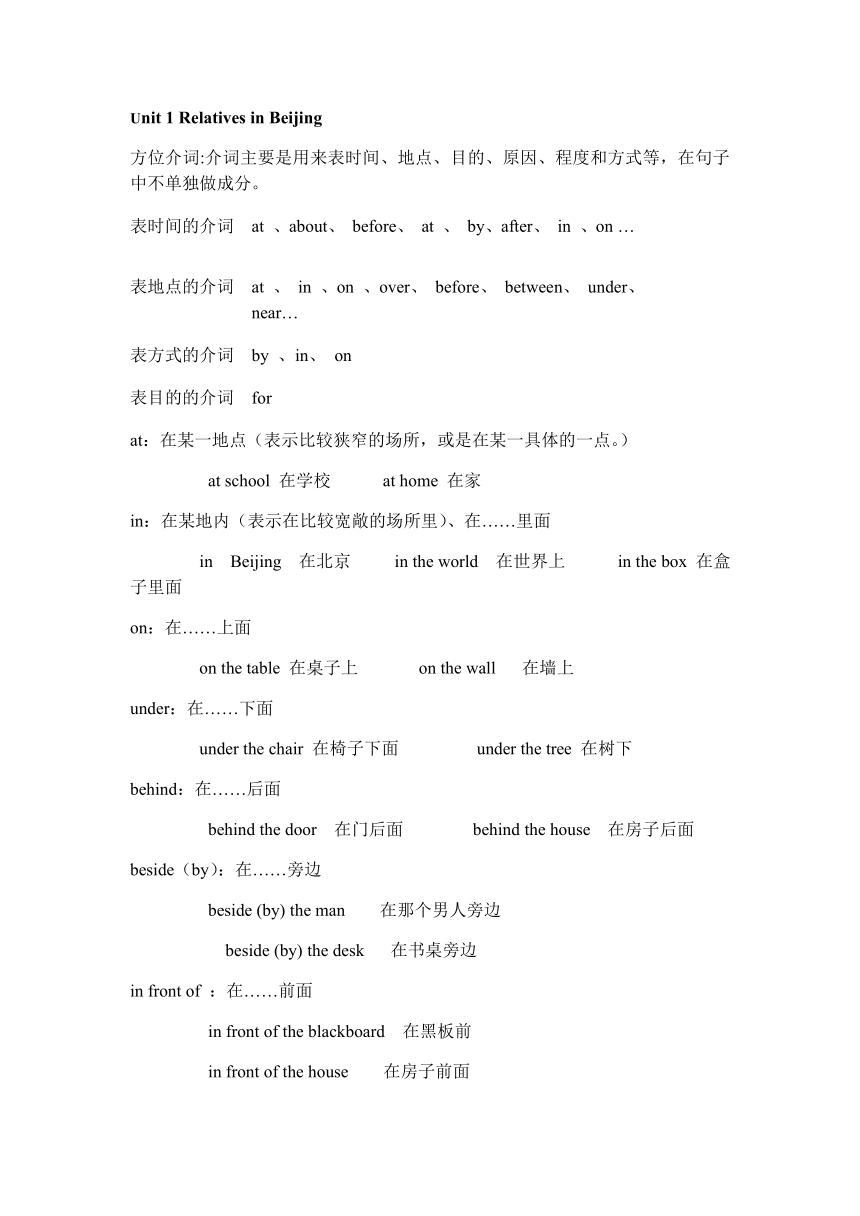
|
|
| 格式 | zip | ||
| 文件大小 | 21.6KB | ||
| 资源类型 | 教案 | ||
| 版本资源 | 牛津上海版(试用本) | ||
| 科目 | 英语 | ||
| 更新时间 | 2020-08-01 00:00:00 | ||
图片预览

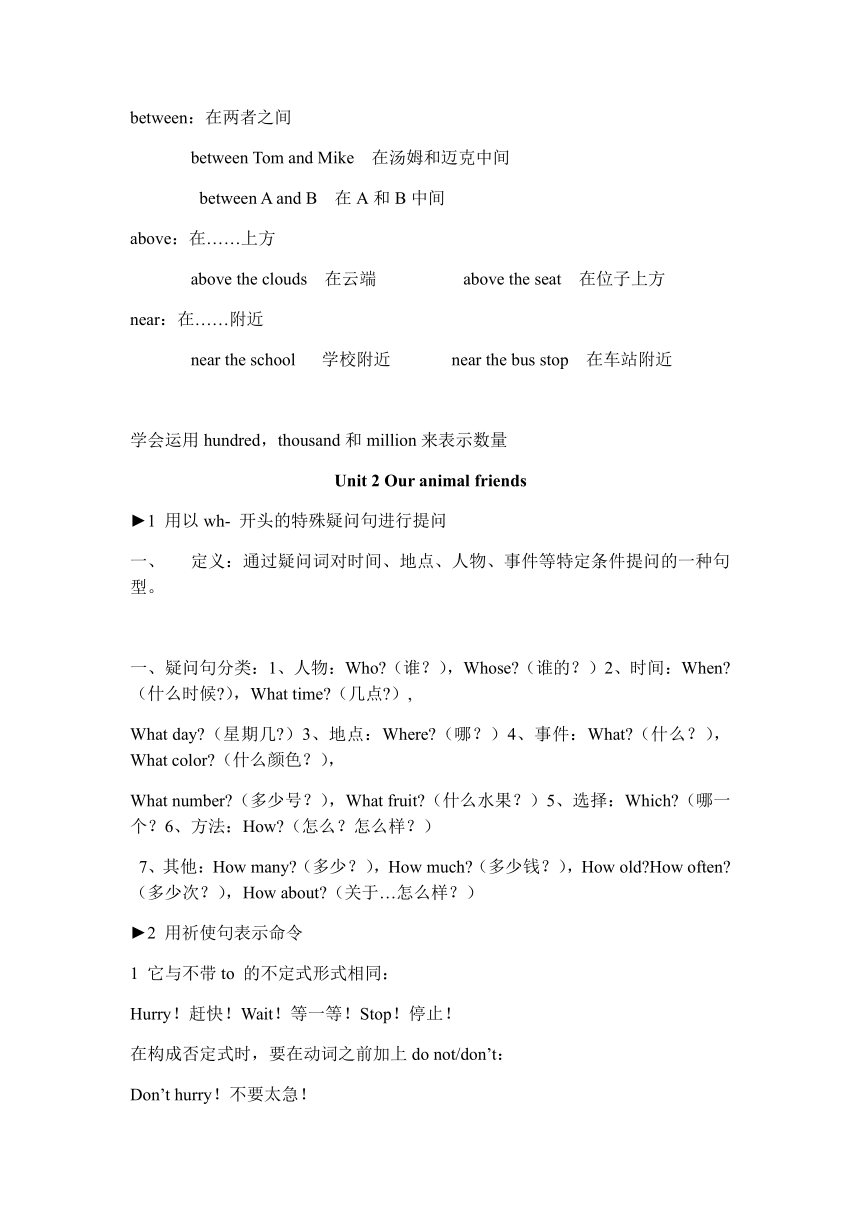
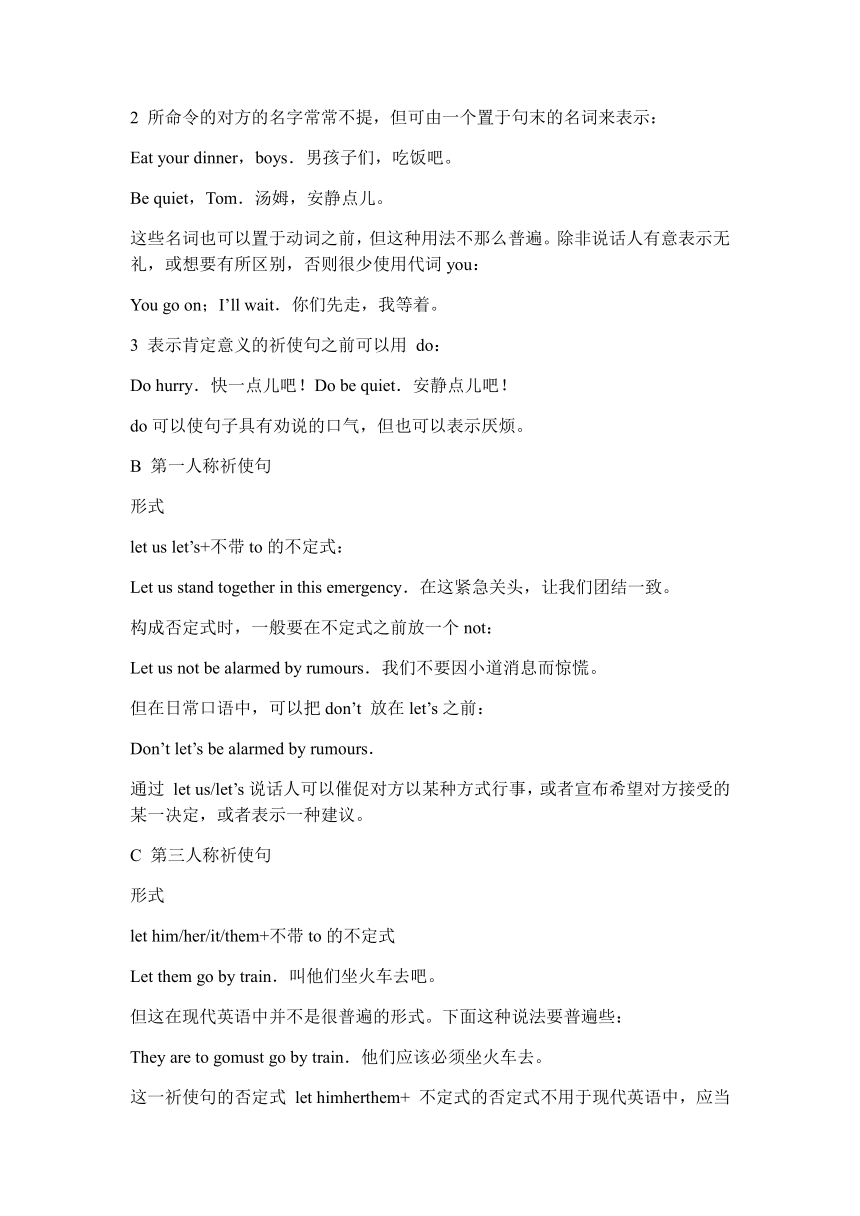
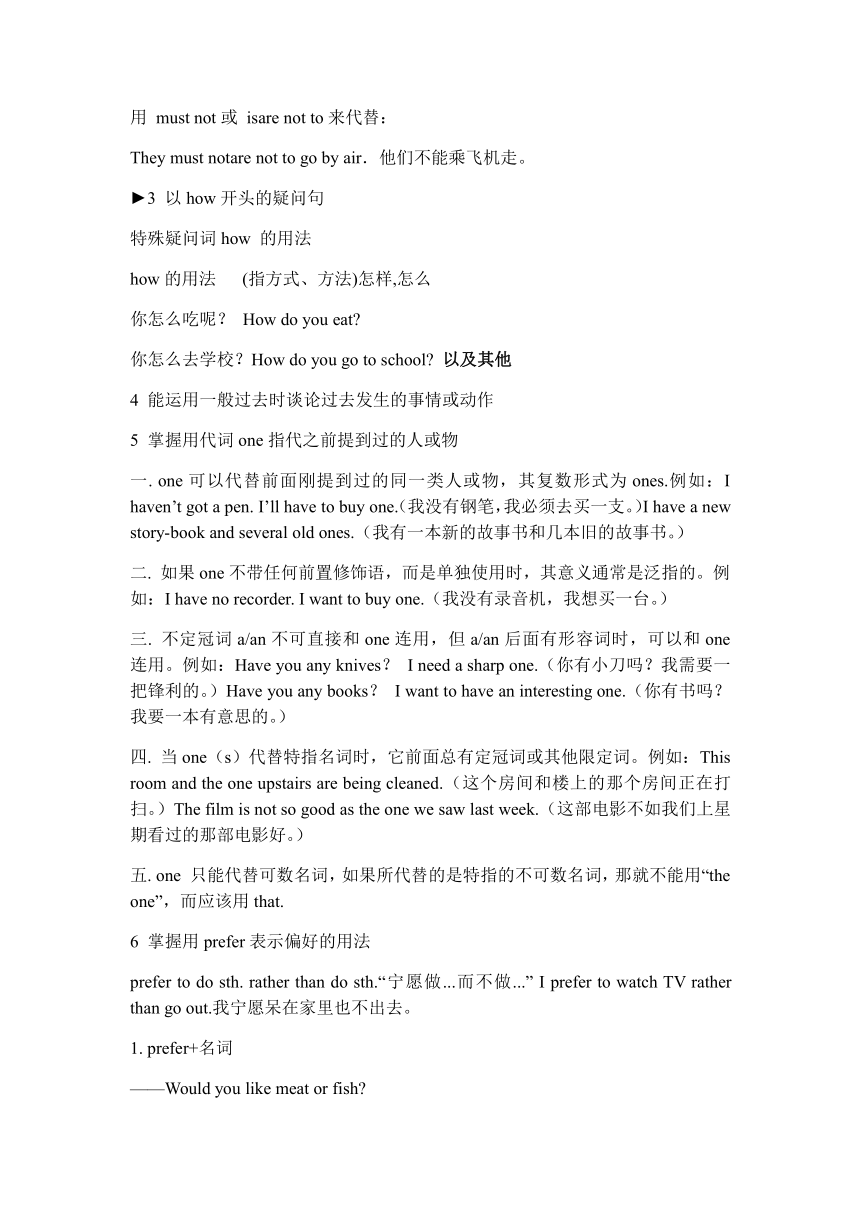
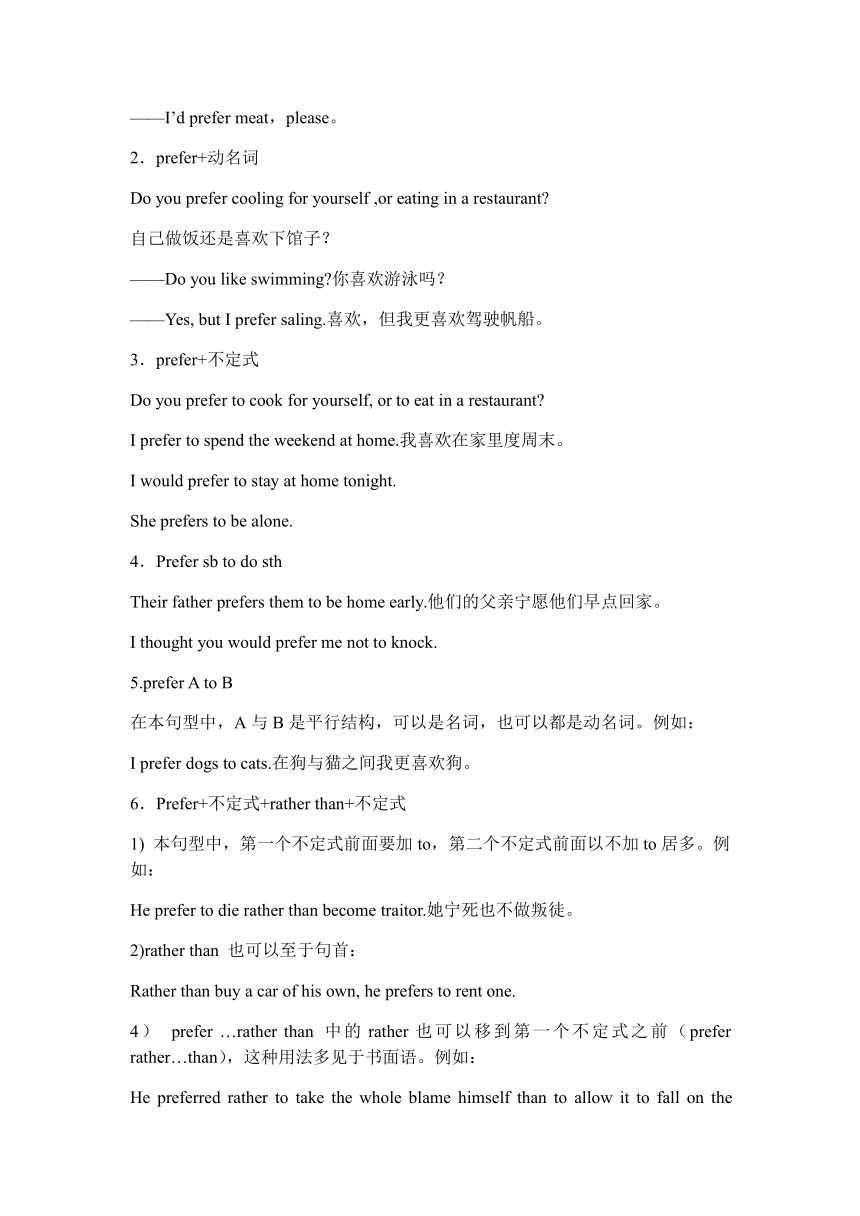
文档简介
Unit
1
Relatives
in
Beijing
方位介词:介词主要是用来表时间、地点、目的、原因、程度和方式等,在句子中不单独做成分。
表时间的介词
at
、about、
before、
at
、
by、after、
in
、on
…
表地点的介词
at
、
in
、on
、over、
before、
between、
under、near…
表方式的介词
by
、in、
on
表目的的介词
for
at:在某一地点(表示比较狭窄的场所,或是在某一具体的一点。)
at
school
在学校
at
home
在家
in:在某地内(表示在比较宽敞的场所里)、在……里面
in
Beijing
在北京
in
the
world
在世界上
in
the
box
在盒子里面
on:在……上面
on
the
table
在桌子上
on
the
wall
在墙上
under:在……下面
under
the
chair
在椅子下面
under
the
tree
在树下
behind:在……后面
behind
the
door
在门后面
behind
the
house
在房子后面
beside(by):在……旁边
beside
(by)
the
man
在那个男人旁边
beside
(by)
the
desk
在书桌旁边
in
front
of
:在……前面
in
front
of
the
blackboard
在黑板前
in
front
of
the
house
在房子前面
between:在两者之间
between
Tom
and
Mike
在汤姆和迈克中间
between
A
and
B
在A和B中间
above:在……上方
above
the
clouds
在云端
above
the
seat
在位子上方
near:在……附近
near
the
school
学校附近
near
the
bus
stop
在车站附近
学会运用hundred,thousand和million来表示数量
Unit
2
Our
animal
friends
?1
用以wh-
开头的特殊疑问句进行提问
一、
定义:通过疑问词对时间、地点、人物、事件等特定条件提问的一种句型。
疑问句分类:1、人物:Who?(谁?),Whose?(谁的?)2、时间:When?(什么时候?),What
time?(几点?),
What
day?(星期几?)3、地点:Where?(哪?)4、事件:What?(什么?),What
color?(什么颜色?),
What
number?(多少号?),What
fruit?(什么水果?)5、选择:Which?(哪一个?6、方法:How?(怎么?怎么样?)
7、其他:How
many?(多少?),How
much?(多少钱?),How
old?How
often?(多少次?),How
about?(关于…怎么样?)
?2
用祈使句表示命令
1
它与不带to
的不定式形式相同:
Hurry!赶快!Wait!等一等!Stop!停止!
在构成否定式时,要在动词之前加上do
not/don’t:
Don’t
hurry!不要太急!
2
所命令的对方的名字常常不提,但可由一个置于句末的名词来表示:
Eat
your
dinner,boys.男孩子们,吃饭吧。
Be
quiet,Tom.汤姆,安静点儿。
这些名词也可以置于动词之前,但这种用法不那么普遍。除非说话人有意表示无礼,或想要有所区别,否则很少使用代词you:
You
go
on;I’ll
wait.你们先走,我等着。
3
表示肯定意义的祈使句之前可以用
do:
Do
hurry.快一点儿吧!Do
be
quiet.安静点儿吧!
do可以使句子具有劝说的口气,但也可以表示厌烦。
B
第一人称祈使句
形式
let
us
let’s+不带to的不定式:
Let
us
stand
together
in
this
emergency.在这紧急关头,让我们团结一致。
构成否定式时,一般要在不定式之前放一个not:
Let
us
not
be
alarmed
by
rumours.我们不要因小道消息而惊慌。
但在日常口语中,可以把don’t
放在let’s之前:
Don’t
let’s
be
alarmed
by
rumours.
通过
let
us/let’s说话人可以催促对方以某种方式行事,或者宣布希望对方接受的某一决定,或者表示一种建议。
C
第三人称祈使句
形式
let
him/her/it/them+不带to的不定式
Let
them
go
by
train.叫他们坐火车去吧。
但这在现代英语中并不是很普遍的形式。下面这种说法要普遍些:
They
are
to
gomust
go
by
train.他们应该必须坐火车去。
这一祈使句的否定式
let
himherthem+
不定式的否定式不用于现代英语中,应当用
must
not或
isare
not
to来代替:
They
must
notare
not
to
go
by
air.他们不能乘飞机走。
?3
以how开头的疑问句
特殊疑问词how
的用法
how的用法
(指方式、方法)怎样,怎么
你怎么吃呢?
How
do
you
eat?
你怎么去学校?How
do
you
go
to
school?
以及其他
4
能运用一般过去时谈论过去发生的事情或动作
5
掌握用代词one指代之前提到过的人或物
一.
one可以代替前面刚提到过的同一类人或物,其复数形式为ones.例如:I
haven’t
got
a
pen.
I’ll
have
to
buy
one.(我没有钢笔,我必须去买一支。)I
have
a
new
story-book
and
several
old
ones.(我有一本新的故事书和几本旧的故事书。)
二.
如果one不带任何前置修饰语,而是单独使用时,其意义通常是泛指的。例如:I
have
no
recorder.
I
want
to
buy
one.(我没有录音机,我想买一台。)
三.
不定冠词a/an不可直接和one连用,但a/an后面有形容词时,可以和one连用。例如:Have
you
any
knives?
I
need
a
sharp
one.(你有小刀吗?我需要一把锋利的。)Have
you
any
books?
I
want
to
have
an
interesting
one.(你有书吗?我要一本有意思的。)
四.
当one(s)代替特指名词时,它前面总有定冠词或其他限定词。例如:This
room
and
the
one
upstairs
are
being
cleaned.(这个房间和楼上的那个房间正在打扫。)The
film
is
not
so
good
as
the
one
we
saw
last
week.(这部电影不如我们上星期看过的那部电影好。)
五.
one
只能代替可数名词,如果所代替的是特指的不可数名词,那就不能用“the
one”,而应该用that.
6
掌握用prefer表示偏好的用法
prefer
to
do
sth.
rather
than
do
sth.“宁愿做...而不做...”
I
prefer
to
watch
TV
rather
than
go
out.我宁愿呆在家里也不出去。
1.
prefer+名词
——Would
you
like
meat
or
fish?
——I’d
prefer
meat,please。
2.prefer+动名词
Do
you
prefer
cooling
for
yourself
,or
eating
in
a
restaurant?
自己做饭还是喜欢下馆子?
——Do
you
like
swimming?你喜欢游泳吗?
——Yes,
but
I
prefer
saling.喜欢,但我更喜欢驾驶帆船。
3.prefer+不定式
Do
you
prefer
to
cook
for
yourself,
or
to
eat
in
a
restaurant?
I
prefer
to
spend
the
weekend
at
home.我喜欢在家里度周末。
I
would
prefer
to
stay
at
home
tonight.
She
prefers
to
be
alone.
4.Prefer
sb
to
do
sth
Their
father
prefers
them
to
be
home
early.他们的父亲宁愿他们早点回家。
I
thought
you
would
prefer
me
not
to
knock.
5.prefer
A
to
B
在本句型中,A与B是平行结构,可以是名词,也可以都是动名词。例如:
I
prefer
dogs
to
cats.在狗与猫之间我更喜欢狗。
6.Prefer+不定式+rather
than+不定式
1)
本句型中,第一个不定式前面要加to,第二个不定式前面以不加to居多。例如:
He
prefer
to
die
rather
than
become
traitor.她宁死也不做叛徒。
2)rather
than
也可以至于句首:
Rather
than
buy
a
car
of
his
own,
he
prefers
to
rent
one.
4)
prefer
…rather
than
中的rather也可以移到第一个不定式之前(prefer
rather…than),这种用法多见于书面语。例如:
He
preferred
rather
to
take
the
whole
blame
himself
than
to
allow
it
to
fall
on
the
innocent.
她宁可自己承担全部责任而不愿让无辜的人受到连累。
5)
prefer
to
do
A
rather
than
do
B
意义相同,试比较:
Joe
prefers
skating
to
skiing.
Joe
prefer
to
skate
rather
than
ski.
7
掌握用need
to表示需要的用法
Unit
3
Friends
from
other
countries
?2
现在完成时的用法
一.
基本结构:助动词have/has+过去分词(done)
二. 句型:
否定句:主语+have/has+not+过去分词+其他.
一般疑问句:Have/Has+主语+过去分词+其他.
简略答语:
Yes,
主语
+
have/has.(肯定)
No,
主语
+
haven't/hasn't.(否定)
三.用法
(1)现在完成时表示过去发生或已经完成的动作对现在造成的影响或结果
I
have
spent
all
of
my
money
(so
far).(含义是:现在我没有钱花了.)
Guo
zijun
has
(just/already)
come.
(含义:郭子君现在在这儿)
My
father
has
gone
to
work.(含义是:我爸爸现在不在这儿)
(2)现在完成时可以用来表示发生在过去某一时刻的,持续到现在的动作(用行为动词表示)或状态(be动词表示)常与for(+时间段),since(+时间点或过去时的句子)连用.
①for+时段②since+过去一个时间点(译为:自从……以来)③since+时段+ago④since+从句(过去时)
●⑤It
is+时段+since+从句(过去时)
Mary
has
been
ill
for
three
days.
I
have
lived
here
since
1998.
四. has
gone
(to),has
been
(to),
has
been
(in)
的区别
Have/Has
gone(to)
:去了(现在不在说话现场)
Where
is
your
father?He
has
gone
to
Shanghai.
Have/Has
been
(to)
:去过(已不在去过的地方)
My
father
has
been
to
Shanghai.
Have/has
been
in:呆了多久(还在所呆的地方)
My
father
has
been
in
Shanghai
for
two
months.
/since
two
months
ago.
五.现在完成时的标志
1. 现在完成时的含义之一是过去完成的动作对现在仍有影响,用以下四大标志词可以表达这种含义:
以already,
just和yet为标志
He
has
already
got
her
help. 他已得到她的帮助。
He
has
just
seen
the
film. 他刚刚看过这场电影。
He
hasn't
come
back
yet. 他还没有回来。
以ever和never为标志
This
is
the
best
film
I
have
ever
seen. 这是我曾经看过的最好的一部电影。
He
has
never
been
to
Beijing. 他从没有到过北京。
以动作发生的次数为标志
He
says
he
has
been
to
the
USA
three
times.
他说他已经去过美国三次了。
以so
far(到目前为止)为标+before
He
has
got
to
Beijing
so
far. 到目前为止他已到了北京。
She
has
passed
the
examso
far. 到目前为止她已经通过了考试。
2.过去已经开始的动作一直延续到现在,
甚至有可能继续延续下去,我们可以从动作“延续”的特性和“时间”点段的区分入手,进一步学习现在完成时。
①for+时段
②since+过去一个时间点(过去
从句)为标志
注意:
1)现在完成时不能单独与过去的时间状语连用,
如yesterday,last
week,
three
years
ago
等;
2)不能与when连用
2.现在完成时往往同表示不确定的过去时间状语连用
★1.have代替buy
My
brother
has
had(不能用has
bought)
this
bike
for
almost
four
years.
★2、用keep或have代替borrow
I
have
kept(不能用have
borrowed)
the
book
for
quite
a
few
days.
★3、用be替代become
How
long
has
your
sister
been
a
teacher?
★4、用have
a
cold代替catch
a
cold
Tom
has
had
a
cold
since
the
day
before
yesterday.
★5、用wear代替put
on
b)用“be+形容词”代终止性动词
1、be+married代marry
2、be+ill代fall
(get)
ill
3、be+dead代die
4、be+asleep代fall
(get)
asleep
5、be+awake代wake/wake
up
6、be+gone代lose,die,sell,leave
7、be+open代open
8、be
closed代close/shut
9、be+missing(gone,lost)代lose
c)用“be+副词”代终止性动词
1“be+on”代start,begin
2“be+up”代get
up
3“be+back(to)”代return
to,come
back
to,go
back
to
4“be
here
(there)”代come(arrive,reach,get)
here或go
(arrive,reach,get)
there等等
d)用“be+介词短语”代终止性动词
1.“be
in/at
+地点”代替go
to
/come
to
2.用be
in
the
army
代替join
the
army
3.“be
in/at
+地点”代替move
to
常用瞬间动词变延续性动词表:
1.
have
arrived
at/in
sw.
got
to/reached
sw.
come/gone/moved
to
sw.
→have
been
in
sw./at…相应的介词
2.
have
come/gone
back/returned
→
have
been
back
3.
have
come/gone
out
→have
been
out
4.
have
become
→
have
been5.
have
closed
/
opened→
have
been
close/open
6.
have
got
up
→
have
been
up;
7.
have
died
→
have
been
dead;
8.
have
left
sw.
→
have
been
away
from
sw.9.
have
fallen
asleep/got
to
sleep
→
have
been
asleep;
10.
have
finished/ended/completed
→
have
been
over;
11.
havemarried
→
have
been
married;
12.
have
started/begun
to
do
sth.
→
have
done
sth.
;13.
have
begun
→
have
been
on
14.
have
borrowed/bought
→have
kept/had
15.
have
lost
→
haven’t
had
16.
have
put
on
→have
worn
17.
have
caught
/get
a
cold
→
have
had
a
cold;
18.
have
got
to
know
→
have
known19.
have/has
gone
to
→
have
been
in
20.
have
joined/have
taken
part
in
the
league/the
Party/the
army
→have
been
a
member
of/
have
been
in/have
been
the
Party’s
member/the
league
member/the
soldier…
一、同义句转换
He
is
the
tallest
student
in
his
class.
He
is
_______
_____
______
______
student
in
his
class.
He
is
______
______
______
______
students
in
his
class.
Peter
draws
well,
Lilei
draws
better.
Lilei
draws
______
of
the
two.
The
tractor
goes
faster
than
the
bike.
The
bike
goes
_____
______
than
the
tractor.
His
cakes
are
dearer
than
the
twins’
cakes.
His
cake
is
______
_______
of
the
three.
二
选择填空
Which
does
Jimmy
like
________
,Chinese
or
Art?
A.
well
B.
best
C.
better
D.
much
2.
The
Chang
jiang
River
is
one
of_________in
the
world.
A.
the
longest
river
B.
longest
rivers
C.
the
longest
rivers
D.
longer
rivers
3.
________
of
the
two
women
is
Mrs
Brown.
A.
The
beautiful
B.
The
more
beautiful
C.More
beautiful
D.
The
most
beautiful
My
mooncake
is
nicer________
his.
A.
like
B.
with
C.
for
D.
than
You
are
fatter
than______
.
A.
he
B.
his
C.
him
D.
he
is
tall
He
jumps
_______of
the
three.
A.
far
B.
further
C.
farthest
D.
furthest
My
hair
is
longer
than
______
.
A.
my
sister
B.
Kate
C.
my
brother’s
D.
Lucys’
There
are____paper
here
.Please
bring
some.
A.
little
B.
less
C.
fewer
D.
a
little
The
pen
is____
than
that
one.
A.
more
cheap
B.
cheap
C.
much
cheaper
D.
quite
cheaper
Tom
speaks
Chinese____better
than
Jimmy.
A.
more
B.
very
C.
a
lot
of
D.
much
There
are
____girls
in
Class
Two
than
in
Class
Four.
A.
more
B.
nicest
C.
most
D.
best
It’s
too
______for
you
to
do
that.
A.
easy
B.
more
dangerous
C.
harder
D.
the
easiest
Who
has
_______apples
now,
Jim,
Lily
or
Lucy?
A.
much
B.
biggest
C.
better
D.
the
most
14.You
have
more
rulers
than
me.
But
_______are
nicer
than
.
A.mine,
yours
B.
mine,
your
C.
my,
yours
D.
my,
your
15.Tingting
is_______than
Meimei,
but
Meimei
is_______than
Tingting.
A.
tall,
stronger
B.
taller,
strongest
C.
tallest,
strong
D.
taller,
stronger
Mother
is
________in
my
family.
A.
busy
B.
busier
C.
the
busiest
D.
more
busy
17.There
are
________in
the
park
on
Sunday.
A.more
children
B.
a
lot
of
people
C.
much
men
and
women
D.
many
peoples
18.The
dumplings
are
______than
the
noodles,I
think.
A.
more
nicer
B.
much
delicious
C.
very
nice
D.
much
more
delicious
She
is
_______than
me
at
drawings.
A.
better
B.
best
C.
good
D.
harder
20.-This
blue
sweater
is
too
big
for
me
.-Will
you
please
show
me
a_______one?
A.
small
B.
smaller
C.
the
smallest
D.
smallest
1
Relatives
in
Beijing
方位介词:介词主要是用来表时间、地点、目的、原因、程度和方式等,在句子中不单独做成分。
表时间的介词
at
、about、
before、
at
、
by、after、
in
、on
…
表地点的介词
at
、
in
、on
、over、
before、
between、
under、near…
表方式的介词
by
、in、
on
表目的的介词
for
at:在某一地点(表示比较狭窄的场所,或是在某一具体的一点。)
at
school
在学校
at
home
在家
in:在某地内(表示在比较宽敞的场所里)、在……里面
in
Beijing
在北京
in
the
world
在世界上
in
the
box
在盒子里面
on:在……上面
on
the
table
在桌子上
on
the
wall
在墙上
under:在……下面
under
the
chair
在椅子下面
under
the
tree
在树下
behind:在……后面
behind
the
door
在门后面
behind
the
house
在房子后面
beside(by):在……旁边
beside
(by)
the
man
在那个男人旁边
beside
(by)
the
desk
在书桌旁边
in
front
of
:在……前面
in
front
of
the
blackboard
在黑板前
in
front
of
the
house
在房子前面
between:在两者之间
between
Tom
and
Mike
在汤姆和迈克中间
between
A
and
B
在A和B中间
above:在……上方
above
the
clouds
在云端
above
the
seat
在位子上方
near:在……附近
near
the
school
学校附近
near
the
bus
stop
在车站附近
学会运用hundred,thousand和million来表示数量
Unit
2
Our
animal
friends
?1
用以wh-
开头的特殊疑问句进行提问
一、
定义:通过疑问词对时间、地点、人物、事件等特定条件提问的一种句型。
疑问句分类:1、人物:Who?(谁?),Whose?(谁的?)2、时间:When?(什么时候?),What
time?(几点?),
What
day?(星期几?)3、地点:Where?(哪?)4、事件:What?(什么?),What
color?(什么颜色?),
What
number?(多少号?),What
fruit?(什么水果?)5、选择:Which?(哪一个?6、方法:How?(怎么?怎么样?)
7、其他:How
many?(多少?),How
much?(多少钱?),How
old?How
often?(多少次?),How
about?(关于…怎么样?)
?2
用祈使句表示命令
1
它与不带to
的不定式形式相同:
Hurry!赶快!Wait!等一等!Stop!停止!
在构成否定式时,要在动词之前加上do
not/don’t:
Don’t
hurry!不要太急!
2
所命令的对方的名字常常不提,但可由一个置于句末的名词来表示:
Eat
your
dinner,boys.男孩子们,吃饭吧。
Be
quiet,Tom.汤姆,安静点儿。
这些名词也可以置于动词之前,但这种用法不那么普遍。除非说话人有意表示无礼,或想要有所区别,否则很少使用代词you:
You
go
on;I’ll
wait.你们先走,我等着。
3
表示肯定意义的祈使句之前可以用
do:
Do
hurry.快一点儿吧!Do
be
quiet.安静点儿吧!
do可以使句子具有劝说的口气,但也可以表示厌烦。
B
第一人称祈使句
形式
let
us
let’s+不带to的不定式:
Let
us
stand
together
in
this
emergency.在这紧急关头,让我们团结一致。
构成否定式时,一般要在不定式之前放一个not:
Let
us
not
be
alarmed
by
rumours.我们不要因小道消息而惊慌。
但在日常口语中,可以把don’t
放在let’s之前:
Don’t
let’s
be
alarmed
by
rumours.
通过
let
us/let’s说话人可以催促对方以某种方式行事,或者宣布希望对方接受的某一决定,或者表示一种建议。
C
第三人称祈使句
形式
let
him/her/it/them+不带to的不定式
Let
them
go
by
train.叫他们坐火车去吧。
但这在现代英语中并不是很普遍的形式。下面这种说法要普遍些:
They
are
to
gomust
go
by
train.他们应该必须坐火车去。
这一祈使句的否定式
let
himherthem+
不定式的否定式不用于现代英语中,应当用
must
not或
isare
not
to来代替:
They
must
notare
not
to
go
by
air.他们不能乘飞机走。
?3
以how开头的疑问句
特殊疑问词how
的用法
how的用法
(指方式、方法)怎样,怎么
你怎么吃呢?
How
do
you
eat?
你怎么去学校?How
do
you
go
to
school?
以及其他
4
能运用一般过去时谈论过去发生的事情或动作
5
掌握用代词one指代之前提到过的人或物
一.
one可以代替前面刚提到过的同一类人或物,其复数形式为ones.例如:I
haven’t
got
a
pen.
I’ll
have
to
buy
one.(我没有钢笔,我必须去买一支。)I
have
a
new
story-book
and
several
old
ones.(我有一本新的故事书和几本旧的故事书。)
二.
如果one不带任何前置修饰语,而是单独使用时,其意义通常是泛指的。例如:I
have
no
recorder.
I
want
to
buy
one.(我没有录音机,我想买一台。)
三.
不定冠词a/an不可直接和one连用,但a/an后面有形容词时,可以和one连用。例如:Have
you
any
knives?
I
need
a
sharp
one.(你有小刀吗?我需要一把锋利的。)Have
you
any
books?
I
want
to
have
an
interesting
one.(你有书吗?我要一本有意思的。)
四.
当one(s)代替特指名词时,它前面总有定冠词或其他限定词。例如:This
room
and
the
one
upstairs
are
being
cleaned.(这个房间和楼上的那个房间正在打扫。)The
film
is
not
so
good
as
the
one
we
saw
last
week.(这部电影不如我们上星期看过的那部电影好。)
五.
one
只能代替可数名词,如果所代替的是特指的不可数名词,那就不能用“the
one”,而应该用that.
6
掌握用prefer表示偏好的用法
prefer
to
do
sth.
rather
than
do
sth.“宁愿做...而不做...”
I
prefer
to
watch
TV
rather
than
go
out.我宁愿呆在家里也不出去。
1.
prefer+名词
——Would
you
like
meat
or
fish?
——I’d
prefer
meat,please。
2.prefer+动名词
Do
you
prefer
cooling
for
yourself
,or
eating
in
a
restaurant?
自己做饭还是喜欢下馆子?
——Do
you
like
swimming?你喜欢游泳吗?
——Yes,
but
I
prefer
saling.喜欢,但我更喜欢驾驶帆船。
3.prefer+不定式
Do
you
prefer
to
cook
for
yourself,
or
to
eat
in
a
restaurant?
I
prefer
to
spend
the
weekend
at
home.我喜欢在家里度周末。
I
would
prefer
to
stay
at
home
tonight.
She
prefers
to
be
alone.
4.Prefer
sb
to
do
sth
Their
father
prefers
them
to
be
home
early.他们的父亲宁愿他们早点回家。
I
thought
you
would
prefer
me
not
to
knock.
5.prefer
A
to
B
在本句型中,A与B是平行结构,可以是名词,也可以都是动名词。例如:
I
prefer
dogs
to
cats.在狗与猫之间我更喜欢狗。
6.Prefer+不定式+rather
than+不定式
1)
本句型中,第一个不定式前面要加to,第二个不定式前面以不加to居多。例如:
He
prefer
to
die
rather
than
become
traitor.她宁死也不做叛徒。
2)rather
than
也可以至于句首:
Rather
than
buy
a
car
of
his
own,
he
prefers
to
rent
one.
4)
prefer
…rather
than
中的rather也可以移到第一个不定式之前(prefer
rather…than),这种用法多见于书面语。例如:
He
preferred
rather
to
take
the
whole
blame
himself
than
to
allow
it
to
fall
on
the
innocent.
她宁可自己承担全部责任而不愿让无辜的人受到连累。
5)
prefer
to
do
A
rather
than
do
B
意义相同,试比较:
Joe
prefers
skating
to
skiing.
Joe
prefer
to
skate
rather
than
ski.
7
掌握用need
to表示需要的用法
Unit
3
Friends
from
other
countries
?2
现在完成时的用法
一.
基本结构:助动词have/has+过去分词(done)
二. 句型:
否定句:主语+have/has+not+过去分词+其他.
一般疑问句:Have/Has+主语+过去分词+其他.
简略答语:
Yes,
主语
+
have/has.(肯定)
No,
主语
+
haven't/hasn't.(否定)
三.用法
(1)现在完成时表示过去发生或已经完成的动作对现在造成的影响或结果
I
have
spent
all
of
my
money
(so
far).(含义是:现在我没有钱花了.)
Guo
zijun
has
(just/already)
come.
(含义:郭子君现在在这儿)
My
father
has
gone
to
work.(含义是:我爸爸现在不在这儿)
(2)现在完成时可以用来表示发生在过去某一时刻的,持续到现在的动作(用行为动词表示)或状态(be动词表示)常与for(+时间段),since(+时间点或过去时的句子)连用.
①for+时段②since+过去一个时间点(译为:自从……以来)③since+时段+ago④since+从句(过去时)
●⑤It
is+时段+since+从句(过去时)
Mary
has
been
ill
for
three
days.
I
have
lived
here
since
1998.
四. has
gone
(to),has
been
(to),
has
been
(in)
的区别
Have/Has
gone(to)
:去了(现在不在说话现场)
Where
is
your
father?He
has
gone
to
Shanghai.
Have/Has
been
(to)
:去过(已不在去过的地方)
My
father
has
been
to
Shanghai.
Have/has
been
in:呆了多久(还在所呆的地方)
My
father
has
been
in
Shanghai
for
two
months.
/since
two
months
ago.
五.现在完成时的标志
1. 现在完成时的含义之一是过去完成的动作对现在仍有影响,用以下四大标志词可以表达这种含义:
以already,
just和yet为标志
He
has
already
got
her
help. 他已得到她的帮助。
He
has
just
seen
the
film. 他刚刚看过这场电影。
He
hasn't
come
back
yet. 他还没有回来。
以ever和never为标志
This
is
the
best
film
I
have
ever
seen. 这是我曾经看过的最好的一部电影。
He
has
never
been
to
Beijing. 他从没有到过北京。
以动作发生的次数为标志
He
says
he
has
been
to
the
USA
three
times.
他说他已经去过美国三次了。
以so
far(到目前为止)为标+before
He
has
got
to
Beijing
so
far. 到目前为止他已到了北京。
She
has
passed
the
examso
far. 到目前为止她已经通过了考试。
2.过去已经开始的动作一直延续到现在,
甚至有可能继续延续下去,我们可以从动作“延续”的特性和“时间”点段的区分入手,进一步学习现在完成时。
①for+时段
②since+过去一个时间点(过去
从句)为标志
注意:
1)现在完成时不能单独与过去的时间状语连用,
如yesterday,last
week,
three
years
ago
等;
2)不能与when连用
2.现在完成时往往同表示不确定的过去时间状语连用
★1.have代替buy
My
brother
has
had(不能用has
bought)
this
bike
for
almost
four
years.
★2、用keep或have代替borrow
I
have
kept(不能用have
borrowed)
the
book
for
quite
a
few
days.
★3、用be替代become
How
long
has
your
sister
been
a
teacher?
★4、用have
a
cold代替catch
a
cold
Tom
has
had
a
cold
since
the
day
before
yesterday.
★5、用wear代替put
on
b)用“be+形容词”代终止性动词
1、be+married代marry
2、be+ill代fall
(get)
ill
3、be+dead代die
4、be+asleep代fall
(get)
asleep
5、be+awake代wake/wake
up
6、be+gone代lose,die,sell,leave
7、be+open代open
8、be
closed代close/shut
9、be+missing(gone,lost)代lose
c)用“be+副词”代终止性动词
1“be+on”代start,begin
2“be+up”代get
up
3“be+back(to)”代return
to,come
back
to,go
back
to
4“be
here
(there)”代come(arrive,reach,get)
here或go
(arrive,reach,get)
there等等
d)用“be+介词短语”代终止性动词
1.“be
in/at
+地点”代替go
to
/come
to
2.用be
in
the
army
代替join
the
army
3.“be
in/at
+地点”代替move
to
常用瞬间动词变延续性动词表:
1.
have
arrived
at/in
sw.
got
to/reached
sw.
come/gone/moved
to
sw.
→have
been
in
sw./at…相应的介词
2.
have
come/gone
back/returned
→
have
been
back
3.
have
come/gone
out
→have
been
out
4.
have
become
→
have
been5.
have
closed
/
opened→
have
been
close/open
6.
have
got
up
→
have
been
up;
7.
have
died
→
have
been
dead;
8.
have
left
sw.
→
have
been
away
from
sw.9.
have
fallen
asleep/got
to
sleep
→
have
been
asleep;
10.
have
finished/ended/completed
→
have
been
over;
11.
havemarried
→
have
been
married;
12.
have
started/begun
to
do
sth.
→
have
done
sth.
;13.
have
begun
→
have
been
on
14.
have
borrowed/bought
→have
kept/had
15.
have
lost
→
haven’t
had
16.
have
put
on
→have
worn
17.
have
caught
/get
a
cold
→
have
had
a
cold;
18.
have
got
to
know
→
have
known19.
have/has
gone
to
→
have
been
in
20.
have
joined/have
taken
part
in
the
league/the
Party/the
army
→have
been
a
member
of/
have
been
in/have
been
the
Party’s
member/the
league
member/the
soldier…
一、同义句转换
He
is
the
tallest
student
in
his
class.
He
is
_______
_____
______
______
student
in
his
class.
He
is
______
______
______
______
students
in
his
class.
Peter
draws
well,
Lilei
draws
better.
Lilei
draws
______
of
the
two.
The
tractor
goes
faster
than
the
bike.
The
bike
goes
_____
______
than
the
tractor.
His
cakes
are
dearer
than
the
twins’
cakes.
His
cake
is
______
_______
of
the
three.
二
选择填空
Which
does
Jimmy
like
________
,Chinese
or
Art?
A.
well
B.
best
C.
better
D.
much
2.
The
Chang
jiang
River
is
one
of_________in
the
world.
A.
the
longest
river
B.
longest
rivers
C.
the
longest
rivers
D.
longer
rivers
3.
________
of
the
two
women
is
Mrs
Brown.
A.
The
beautiful
B.
The
more
beautiful
C.More
beautiful
D.
The
most
beautiful
My
mooncake
is
nicer________
his.
A.
like
B.
with
C.
for
D.
than
You
are
fatter
than______
.
A.
he
B.
his
C.
him
D.
he
is
tall
He
jumps
_______of
the
three.
A.
far
B.
further
C.
farthest
D.
furthest
My
hair
is
longer
than
______
.
A.
my
sister
B.
Kate
C.
my
brother’s
D.
Lucys’
There
are____paper
here
.Please
bring
some.
A.
little
B.
less
C.
fewer
D.
a
little
The
pen
is____
than
that
one.
A.
more
cheap
B.
cheap
C.
much
cheaper
D.
quite
cheaper
Tom
speaks
Chinese____better
than
Jimmy.
A.
more
B.
very
C.
a
lot
of
D.
much
There
are
____girls
in
Class
Two
than
in
Class
Four.
A.
more
B.
nicest
C.
most
D.
best
It’s
too
______for
you
to
do
that.
A.
easy
B.
more
dangerous
C.
harder
D.
the
easiest
Who
has
_______apples
now,
Jim,
Lily
or
Lucy?
A.
much
B.
biggest
C.
better
D.
the
most
14.You
have
more
rulers
than
me.
But
_______are
nicer
than
.
A.mine,
yours
B.
mine,
your
C.
my,
yours
D.
my,
your
15.Tingting
is_______than
Meimei,
but
Meimei
is_______than
Tingting.
A.
tall,
stronger
B.
taller,
strongest
C.
tallest,
strong
D.
taller,
stronger
Mother
is
________in
my
family.
A.
busy
B.
busier
C.
the
busiest
D.
more
busy
17.There
are
________in
the
park
on
Sunday.
A.more
children
B.
a
lot
of
people
C.
much
men
and
women
D.
many
peoples
18.The
dumplings
are
______than
the
noodles,I
think.
A.
more
nicer
B.
much
delicious
C.
very
nice
D.
much
more
delicious
She
is
_______than
me
at
drawings.
A.
better
B.
best
C.
good
D.
harder
20.-This
blue
sweater
is
too
big
for
me
.-Will
you
please
show
me
a_______one?
A.
small
B.
smaller
C.
the
smallest
D.
smallest
同课章节目录
- Module 1 Relationships
- Unit 1 Relationships in beijing
- Unit 2 Our animal friends
- Unit 3 Friends from other countries
- Module 2 My Neighborhood
- Unit 4 Jobs people do
- Unit 5 Choosing a new flat
- Unit 6 Different places
- Unit 7 Signs around us
- Module 3 Diet and health
- Unit 8 Growing healthy,growing
- Unit 9 International Food Festival
- Unit 10 A birthday party
- Unit 11 My food project
